This web page is obsolete. Please visit http://live.gnome.org/Gucharmap.
gucharmap is a Unicode character map. It uses the gtk+ toolkit and runs on any platform that gtk+ supports.
news
- Mon Mar 22 23:37:30 EST 2004
-
1.4.0 is released. Changes since 1.2.0:
- View by script as well as by Unicode block.
- New documentation in the following languages: de es fr it ja ko sv zh_CN zh_HK zh_TW
- English documentation improved and updated.
- Search modified to look in CJK ideograph definitions as well as character names. Search heuristic also improved in other areas.
- Bothersome gucharmap input method removed.
- Many user interface improvements.
- Much code reorganized.
- New and updated translations: ar az bn ca cs cy da de el en_CA en_GB es fa fi fr ga hi id it ja ko lt mn ms nl no pa pl pt pt_BR sk sq sr sr@Latn sv th uk zh_CN
- Thu Nov 20 17:30:50 EST 2003
1.2.0 is released. Changes since 1.0.0:
- Help, by Chee Bin HOH.
- Add smarts to search dialog. Now you can enter a code point, or the character you want to jump to, as well as search by character name.
- Removed “Search/Code Point”. Use search dialog instead.
- Removed Back and Forward buttons since they were confusing and seldom used.
- New and updated translations: ca,fi,it,ta,uk,vi,wa.
- Other fixes. (Keith Packard, Mariano Suárez-Alvarez)
- Wed Sep 10 16:11:00 EDT 2003
- 1.0.0 is released. There are no big changes in this release. A couple of bug fixes, and lots of updated translations. This is the version in GNOME 2.4.0.
- Wed, 2 Jul 2003 05:48:16 +1000
- It has been officially decided that gucharmap will be in the GNOME 2.4 desktop.
- Tue Jun 10 23:43:28 EDT 2003
0.8.0 is released. Significant changes since 0.6.1:
- full character details are now in a textview in separate tab
- as a result of this, much of the View menu evaporates
- characters mentioned in the details tabs are clickable links; back and forward history for clicked-characters
- useful character information is shown in the status bar; this includes at a minimum the codepoint and character name; for CJK ideographs, the definition; usage notes if the character has any
- got rid of the U+xxxx page listings in the left pane, since they weren't very useful
- search and jump-to-codepoint dialogs are a bit nicer, work better
- got rid of Zoom Mode menu item; keyboard users can hold down Shift instead
- install “gnome-character-map” symlink to gucharmap (requested by the gcharmap maintainer)
- change “Char_map” menu to “_File”
- it says in the magnification window which font is actually being used to draw the character
- function names in the public API changed to start with “gucharmap_” prefix
- header files start with “gucharmap”; only need to #include <gucharmap/gucharmap.h>
- ./configure option not to generate gtk.immodules (mainly useful for distro package maintainers)
- accessibility fix: emit active-descendant-changed signal when selected cell changes (bug #112981, Padraig O'Briain)
- ignore keypresses with modifiers in the character table
- new and updated translations: cs de es it ja ko ms nl pt ru sv zh_CN zh_TW
- highlight the active unicode block in the character table
- bold and italic buttons in the font selection, instead of a list of styles
Old news elided.
download
Download gucharmap from GNOME ftp.
Or, you can check out the very latest version from cvs:
cvs -d:pserver:anonymous@anoncvs.gnome.org:/cvs/gnome co gucharmap
You can also browse the source with lxr.
screenshots
Updated Mon Jun 9 01:51:13 EDT 2003.
- The highlighted blue part shows the full extent of the block selected in the left pane (“Combining Diacritical Marks”).
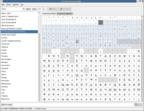
- More information in the details tab. Those link-looking things do about what you'd expect. The Back and Forward buttons are for link-following history.
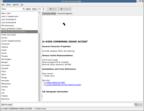
- Hold down the right mouse button or the shift key to see the character magnified. Tells you what font is actually being used to draw the glyph.
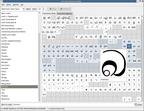
- Tries to be smart about what to tell you in the status bar.
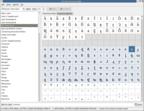
- You can see where the status bar information is coming from.
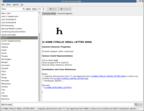
- I followed a link. The Back button isn't greyed out anymore.
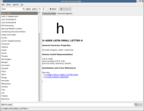
- For CJK ideographs (Chinese characters), it shows the definition in the status bar.
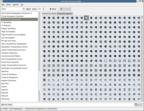
features
-
Can display information about each character:
- Unicode code point
- Unicode character name
- Unicode category
- Unicode canonical decomposition
- UTF-8 encoding (e.g. 0xE2 0x86 0x90)
- other representations useful to programmers
For CJK ideographs (unless not compiled in):
- definition
- Mandarin pronunciation
- Cantonese pronunciation
- Tang pronunciation
- Korean pronunciation
- Japanese Kun pronunciation
- Japanese On (“Sino-Japanese”) pronunciation
All of this information comes from the Unicode standard.
- view in any font at any point size, switch among fonts quickly
- browse characters by Unicode block
- identify the first character from the clipboard or X selection
- copy strings of characters chosen from the table to the clipboard and X selection
- search for a character by name
- jump to a character by code point
- drag selection into the charmap to identify a character
- drag and drop out of the charmap
- magnify the active character
- see which font is actually being used to draw each character’s glyph
- the character map is a gtk+ widget, and can be used in other programs
links to stuff gucharmap uses
- gtk.org
- unicode.org
- http://www.unicode.org/Public/UNIDATA/Blocks.txt
- http://www.unicode.org/Public/UNIDATA/UnicodeData.txt (warning: large text file)
- http://www.unicode.org/Public/UNIDATA/NamesList.txt (warning: also a large text file)
- http://www.unicode.org/Public/UNIDATA/Unihan.zip (warning: also a large file)
related programs
- Juliusz Chroboczek’s ucm
- the windows character map
- gcharmap/gnome-character-map
- kcharmap, the kde character map
- umap, “a Unicode clipboard filler”
- Unibook™ Character Browser
- Lord Pixel’s Unicode Font Info for Mac OS X
- UnicodeChecker for OS X
Also see Project UTF-8.
copyright
gucharmap is copyright © 2003 Noah Levitt <nlevitt columbia edu>
gucharmap is free software; you can redistribute it and/or modify it under the terms of the GNU General Public License as published by the Free Software Foundation; either version 2 of the License, or (at your option) any later version.
gucharmap is distributed in the hope that it will be useful, but WITHOUT ANY WARRANTY; without even the implied warranty of MERCHANTABILITY or FITNESS FOR A PARTICULAR PURPOSE. See the GNU General Public License for more details.
![[gucharmap icon]](gucharmap.png)
